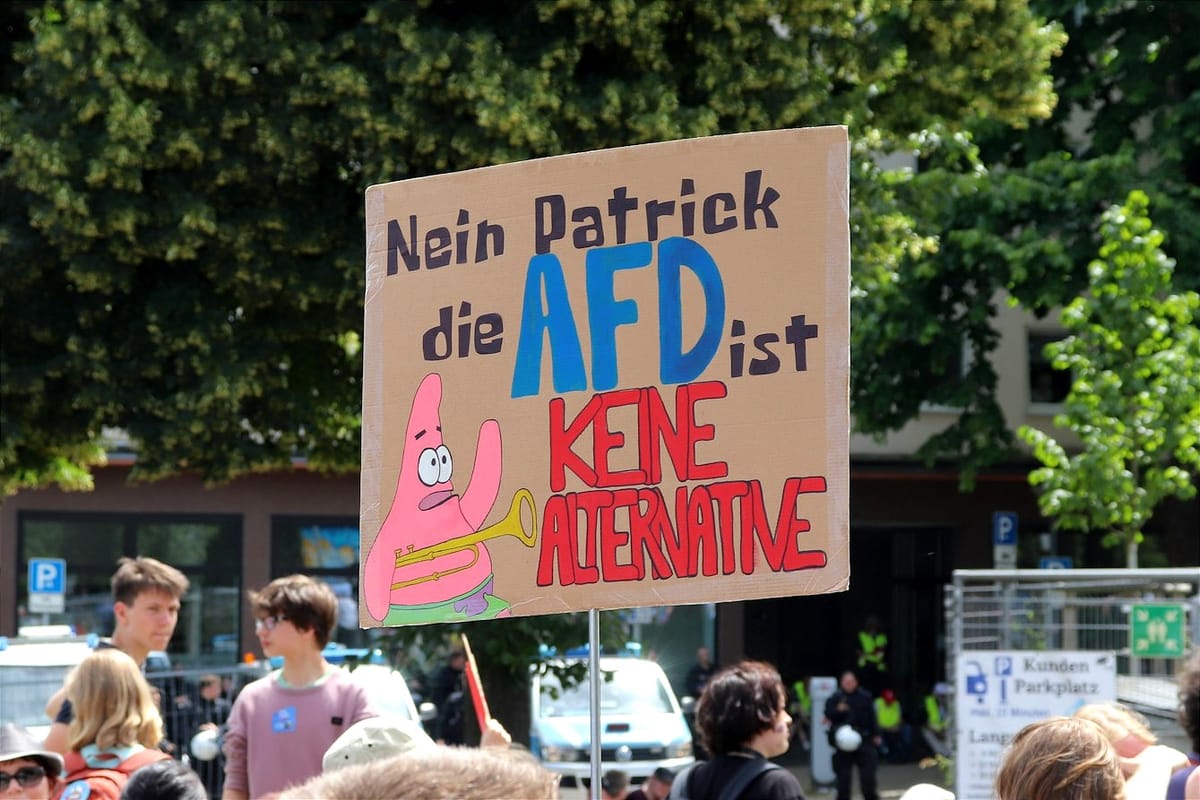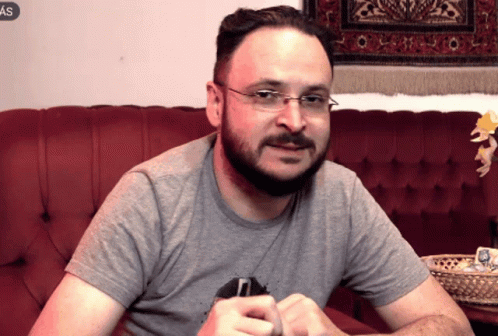The psychology of far-right support
How fear, group identity and authoritarianism fuel far-right support - and how to counter it.

Hello!
This week we look at the psychology of far-right voters.
You may be aware that the Alternative for Germany (AfD) won almost a third of the vote in last week's election, sending shockwaves across the country and leaving political analysts in a state of shock.
But how did we get here?
What was going on in their heads?

Well, actually, probably quite a lot.
And possibly many things at once.
Let's go through a few possible ones.
PS: These are just possibilities. An exercise on psychology and critical thinking. It goes without saying that only proper studies can identify what truly happened in the voters' heads.
Group Identity and In-Group Bias: "Us vs. Them"
First up, let’s talk about group identity, a timeless psychological construct that says, “If you’re not with us, you are against us.”
Human are social beings and like being in groups or "tribes". Paradoxically, we tend to be distrustful and confrontational to other groups.
In Thuringia, the AfD has cleverly capitalised on this by painting a vivid picture of an endangered in-group - ethnic Germans, especially in the eastern regions - facing a "horde" of outsiders. If this sounds like a medieval siege mentality, that's because it essentially is. Replace "outsiders" with "immigrants", "EU bureaucrats" or "political elites" and you have a modern narrative that taps into ancient psychology.
This in-group bias is a psychological crutch for many voters who feel left behind by globalisation or see their traditional way of life under threat. The AfD does not just encourage these fears - it nurtures them, feeding voters a steady diet of "You are one of us, and those other guys? They are coming to take everything you hold dear."
Funnily enough, this is the same mentality that makes people join cults, support losing sports teams, or take up birdwatching: a desperate need to be part of something, anything, where they feel included and important. So, in a way, voting for the AfD is like joining a really unhappy fan club - one with hideous merchandise.

Perceived threat and fear: the world is a scary place
If group identity is the core, fear is the fuel that keeps it burning. The AfD excels at tapping into voters' primal fears, especially those related to economic instability and cultural change. It is not just any fear - it is existential fear. The fear that a foreign worker will take your job, that some faceless bureaucrat in Brussels will wipe out your cultural values, or that your entire way of life is on the brink.
Here is the fascinating thing: this fear is not just political theatre - it may be wired into the brain itself. Recent studies suggest that people with right-wing views tend to have a larger, more reactive amygdala - the brain's hub for processing fear and threat. This could mean they are more attuned to perceived dangers, real or imagined.
Sure, every society faces real challenges, but the human brain - especially one with a hypersensitive amygdala - tends to amplify threats, especially when they are fed to us non-stop by media and political rhetoric. The AfD functions like a psychological specter, lurking in the background of public discourse, ready to pounce on any hint of insecurity.
And people believe it. Why? Because fear cuts through the noise. It bypasses rational thought, taps directly into our limbic system - where the amygdala reigns - and triggers the instinct to fight, flee or, more often, vote for the candidate who promises to defeat the invisible enemy. In Thuringia, the AfD has become this supposed guardian, even though it seems to see threats lurking around every corner.
Authoritarianism and the need for order
Some people urge for a strong, decisive leadership. This urge tends to surface in times of perceived chaos, when it feels like the world is spinning out of control.
When you feel lost, you long for someone to show you the way.

Enter the AfD, which steps in with promises of order, tradition and a return to the "good old days" when (allegedly) everyone knew their role and everything ran smoothly. This appeal to authoritarianism strikes a chord with voters who are fed up with what they see as the indecisiveness, complexity and moral ambiguity of modern liberal democracies. These voters want straightforward solutions, ideally from a leader who speaks in absolutes.
Psychologists call this a need for cognitive closure - basically, a preference for black-and-white thinking because it is less stressful (less demanding cognitively and energetically speaking) than grappling with the messy, grey areas of life. The AfD's rhetoric caters to this need by offering clear, if oversimplified, answers to complex questions. It is political fast food: it is not nutritious, but it is a quick and easy way to get some satisfaction.
Social dominance orientation (SDO)
And there is no authoritarianism without social dominance orientation (SDO). This psychological concept describes people who believe that society should have a clear hierarchy, with some groups naturally at the top. Essentially, these are the people who think the world works best when everyone knows their place - and they are pretty sure they know exactly where that is.

The AfD's platform, with its focus on nationalism and often thinly veiled ethnocentrism, speaks directly to those with high SDO. These voters see the world as a competitive jungle where only the strongest groups thrive, and they are convinced that their group - whether defined by nationality, race or religion - belongs at the top of the food chain.
In Thuringia, this often translates into a belief that ethnic Germans should be prioritised in all areas of life, from jobs to cultural representation. The AfD, with its exclusionary policies and rhetoric, provides a political home for these views, reinforcing the idea that some groups deserve to dominate others.
It is a bit like school, where the popular kids ran the show and everyone else had to fall in line. But unlike high school, where most people eventually outgrow this mindset, SDO can persist into adulthood, shaping political attitudes and voting patterns. The AfD's success in Thuringia shows how powerful hierarchical thinking can be, even in a society that claims to value equality.
Misinformation and Conspiracy Theories
Some would say we are living in the age of misinformation. The internet, social media, and certain media outlets have made it easier than ever to spread falsehoods, half-truths, and outright conspiracy theories. And guess what? The AfD has been more than happy to ride this wave, using misinformation as a tool to rally support and discredit opponents.

From stoking fears about immigration to spreading dubious claims about the EU, the AfD has crafted a narrative that resonates with voters who are already distrustful of mainstream institutions. For some, believing in these conspiracy theories offers a sense of control in a chaotic world. If you can explain away complex problems with simple, conspiratorial answers, it is easier to navigate the uncertainties of modern life.
The psychological mechanism at work here is known as confirmation bias, where people are more likely to believe information that confirms their pre-existing beliefs and dismiss anything that contradicts them. The AfD’s messaging is tailored to exploit this bias, creating echo chambers where misinformation is not only accepted but celebrated.
It is the political equivalent of finding your own personalized rabbit hole and diving headfirst into it. And once you are down there, surrounded by like-minded individuals and their shared "truths," it is incredibly difficult to climb back out.
Relative deprivation: "But what about me?!"
Relative deprivation is not necessarily about being poor or disenfranchised in an absolute sense, but rather about the perception that others are doing better at your expense. It is getting the short end of the stick in a particular scenario.

In Thuringia, where economic opportunities may be perceived as (and probably are) scarcer than in other parts of Germany, relative deprivation can fuel resentment. The AfD taps into this by portraying immigrants, the EU, or even other Germans from more prosperous regions as the “other” who is unfairly benefiting while the local population is left behind.
This perception of unfairness can be a powerful motivator, and the AfD amplifies this sense of deprivation by promising to level the playing field - or, more accurately, tilt it in favour of those who feel they have been shortchanged.
Social influence and normative pressure: "Everyone else is doing it."
Humans are social creatures, and our behavior is often influenced by those around us. This is where social influence and normative pressure come into play. In Thuringia, as more people support the AfD, it creates a bandwagon effect where others feel compelled to follow suit, either because they genuinely agree or because they want to fit in with their social circle.
"If everyone jumped off a cliff, would you do it too?" - Mom
This is especially true in smaller communities, where going against the grain can lead to social ostracism. If your friends, family or neighbours are all voting for the AfD, you may feel pressured to do the same, even if you have reservations. After all, most people do not want to be the odd one out at the neighbourhood barbecue.
The media also plays a role. The more coverage the AfD gets, the more it normalises its views, making it easier for people to justify their support. It is a feedback loop that can be hard to break, especially when everyone around you seems to be on the same page.
Moral disengagement: when doing the right thing does not matter
Perhaps I have left the most important one for last.
Because none of these phenomena explain:
What about other people?
What about doing the right thing and not doing the wrong thing?
The people don't know the Party's real intentions?
This is called moral disengagement. It is the process by which people convince themselves that unethical behaviour is acceptable, or at least justifiable. This is the psychological mechanism that allows voters to support a party like the AfD, even if they have reservations about some of its more extreme policies.

Albert Bandura’s theory of moral disengagement outlines specific ways that individuals detach their actions from their ethical standards. People employ cognitive restructuring to morally justify harmful behaviour, euphemistically labeling actions to minimize their perceived harm, or comparing them to worse actions to make them seem benign. This cognitive process allows them to believe that they are still good people, despite the unethical consequences of their choices.
Moral disengagement can take many forms. Some might downplay the harm caused by the AfD's policies, convincing themselves that the ends justify the means—what Bandura describes as advantageous comparison. Others might dehumanise the out-groups targeted by the AfD, reducing empathy and making it easier to accept discriminatory policies—this is moral justification through dehumanization. Still others might shift the blame, arguing that the real responsibility lies with those who 'forced' the AfD to take such a hardline stance, a form of displacement or diffusion of responsibility.
Social identity theory can further explain this by showing how people derive their self-esteem from their group affiliations. When individuals tie their identity to the AfD, distancing themselves from the moral implications of their choices becomes easier. They might not feel personally responsible for harmful actions because they see themselves as acting on behalf of a greater cause—the Party's cause. When moral disengagement intertwines with group identity, loyalty to the group overrides personal ethical codes.
Some can actively do evil.
Some can passively allow evil to happen.
Ultimately, moral disengagement allows voters to maintain a positive self-image while supporting a party that promotes harmful policies. They displace their own moral responsibility onto the Party’s decisions or the broader socio-political context.
That's what lets them sleep at night.
Conclusion and Recommendations
The psychological mechanisms behind far-right voter behaviour in Thuringia reveal much about human nature—our need for belonging, security, and clear-cut solutions to complex problems. From in-group biases and fear-based politics to moral disengagement and authoritarian inclinations, these forces are at play not only in Thuringia but across the world.
And you might be asking yourself: How should I engage with individuals who hold these beliefs?

It depends.
Here are some possibilities for action when interacting with far-right supporters:
Avoid Direct Confrontation or Aggressive Debates
Arguing rarely changes minds. Research shows that confrontational tactics reinforce existing beliefs. Instead of debating, try a calm, respectful conversation that encourages critical reflection.
Focus on Shared Values, Not Differences
To reduce the "us vs. them" mentality, find common ground. Focus on shared concerns like local community issues, economic insecurity, or the well-being of future generations. Highlighting these shared values creates understanding and reduces the divide.
Encourage Personal Stories and Empathy
If we see people as individuals, not threats, it's harder to be biased. Sharing personal stories or introducing people to stories from other groups can help.
Don’t Expect Immediate Change – Plant Seeds
Changing beliefs takes time. Instead of expecting a single conversation to lead to an immediate shift, think of your engagement as planting seeds. Offer different viewpoints and let them sit with these ideas. Over time, exposure to different perspectives may lead to change.
Know When to Step Back
Sometimes, a conversation won't be productive. When someone is deeply set in their beliefs and showing signs of moral disengagement, it may be best to step back. Focus on dialogue with those who are more open to self-reflection and change.
Promote Exposure to Diverse Experiences
If you can, get people involved in activities or events that help them understand other cultures and groups. Sometimes, seeing diversity in action is the best way to help people understand it.
Ultimately, the objective is not to win an argument, but to open channels of communication. We can challenge harmful ideologies without alienating those who hold them by using empathy, patience, and respect to foster dialogues.
No name calling - no "monsters", "morons", "nazis".
Remember: dehumanisation is exactly what you are trying to fight against.





